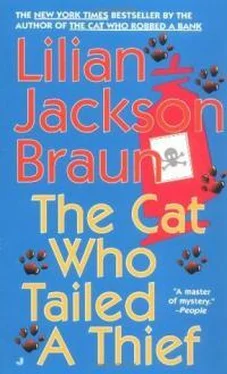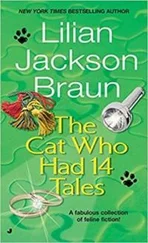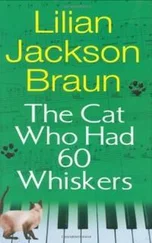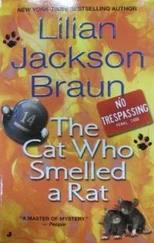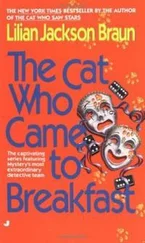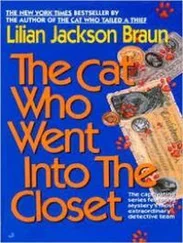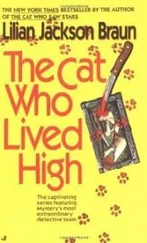Лилиан Браун - The Cat Who Tailed A Thief
Здесь есть возможность читать онлайн «Лилиан Браун - The Cat Who Tailed A Thief» весь текст электронной книги совершенно бесплатно (целиком полную версию без сокращений). В некоторых случаях можно слушать аудио, скачать через торрент в формате fb2 и присутствует краткое содержание. Год выпуска: 2011, Жанр: Детектив, на английском языке. Описание произведения, (предисловие) а так же отзывы посетителей доступны на портале библиотеки ЛибКат.
- Название:The Cat Who Tailed A Thief
- Автор:
- Жанр:
- Год:2011
- ISBN:нет данных
- Рейтинг книги:3 / 5. Голосов: 1
-
Избранное:Добавить в избранное
- Отзывы:
-
Ваша оценка:
- 60
- 1
- 2
- 3
- 4
- 5
The Cat Who Tailed A Thief: краткое содержание, описание и аннотация
Предлагаем к чтению аннотацию, описание, краткое содержание или предисловие (зависит от того, что написал сам автор книги «The Cat Who Tailed A Thief»). Если вы не нашли необходимую информацию о книге — напишите в комментариях, мы постараемся отыскать её.
prizewinning reporter Jim
Qwilleran—along with his
lovable Siamese cats Koko and
Yum Yum—solve a mystery that
arises when a local banker dies under suspicious circumstances,
leaving behind a flashy young
widow, an unfinished house-
restoration project, and a trail of
clues as elusive as a cat burglar
in the night . . .
The Cat Who Tailed A Thief — читать онлайн бесплатно полную книгу (весь текст) целиком
Ниже представлен текст книги, разбитый по страницам. Система сохранения места последней прочитанной страницы, позволяет с удобством читать онлайн бесплатно книгу «The Cat Who Tailed A Thief», без необходимости каждый раз заново искать на чём Вы остановились. Поставьте закладку, и сможете в любой момент перейти на страницу, на которой закончили чтение.
Интервал:
Закладка:
Upon arrival, Qwilleran had first checked the whereabouts of Polly's Siamese. Now he noticed that Bootsie was watching him and crouched as if ready to spring.
Qwilleran inquired, "Why doesn't he lay comfortably on his brisket, the way other cats do?"
"He's not relaxed in your presence, dear," she explained.
"Bootsie's not relaxed?" he exploded. "What about Qwilleran? Did I ever pounce on his back and refuse to get off? Did I ever ambush him from underneath a table?"
"I'll put him upstairs in his room," she said, "or all three of us will have indigestion."
They had much to talk about. Qwilleran described his forthcoming book: a compilation of Moose County legends, anecdotes, and scandals, to be title Short and Tall Tales. All would be collected on tape, and it might be possible to produce a recorded book, as well as a print edition. Homer Tibbit would kick off with the story of the Dimsdale Jinx. Suggestions would be welcome.
"Try Wetherby Goode," she said. "He has stories about lake pirates that he tells to children at the library once in a while. Do you ever see him?"
"Only when he's shoveling his sidewalk. He has a cat so he can't be too bad. It's a technocat who operates an electronic device that plays only Sousa marches."
"That reminds me, Qwill. You haven't mentioned how you like Adriana Levouvreur. I've never heard it myself and don't know anything about the composer."
He had forgotten to listen to his Christmas gift, but he had read the brochure and spoke convincingly. "Francesco Cilea was born in Italy in 1866 and had already composed works at the age of nine. Adriana is an interesting opera with good female roles and some lush melodies. We'll listen to it together, some Sunday afternoon." He had handled that rather well but took the precaution of changing the subject. "Have you and Lynette made your annual pilgrimage to the hill?"
Lynette had a driving desire to visit the Hilltop Cemetery once every winter. The gravestones on the crest of the hill, rising from the snow and silhouetted against the sky, were a moving sight when viewed from the base of the slope. Her ancestors were among them, and one gravesite was reserved for the "the last of the Duncans-by-blood."
Polly said, "I don't mind going with her. On a good day it's a beautiful sight. It would make a poignant painting...Incidentally, Lynette is on cloud nine; Carter Lee phoned her from Detroit. He's coming back and wants her to be cheerleader for the Pleasant Street project."
"Is this a paid position?"
"I don't think so, but Lynette enjoys working for a cause, and she's very enthusiastic about the project. He took her to dinner several times before he left, and she was the first property owner to sign a contract...By the way, her birthday will be soon, and I'd like to give a party. Would you join us?"
"If you'll let me provide the champagne and birthday cake."
"That would be nice. But no candles! It's her fortieth. I'd invite Carter Lee, or course, and that would mean inviting Danielle, and that would mean inviting another man."
"How abut John Bushland?" Qwilleran said. "He'll bring his camera." It occurred to him that the presence of a professional photographer might distract the photogenic young widow.
They had dined on petti di pollo con funghi e noci and were now having decaffeinated coffee in the living room when Qwilleran felt he was being watched again. Bootsie was staring at him between the balustrade of the balcony railing.
"Oh, dear! He got out!" Polly said. "He's learned to stand on his hind legs and hang on the lever-type door handle. Does Koko do that?"
"Not yet," Qwilleran said with some disquietude. "Not yet!"
-8-
The first contributor to Short and Tall Tales was to be Homer Tibbitt, official historian of Moose County, who knew the story of the Dimsdale Jinx. The retired educator, now in his late nineties, was still researching and recording local history, and his fantastic memory made him a treasure. He might not remember where he left his glasses or what he had for breakfast, but events and personages of the distant past could be retrieved on demand. He lived with his sweet eighty-five-year-old wife in a retirement village, her responsibilities being to find his glasses, watch his diet, and drive the car - in good weather. In winter they both welcomed visitors.
"How were your holidays?" Qwilleran greeted them. "Was Santa good to you? Did he bring you a few more books?" Their apartment was cluttered with books and memorabilia.
Rhoda touched her ears prettily. "Homer gave me these garnet earrings. They were in his family."
Her husband, a bony figure sitting in a nest of cushions, was wearing a maroon shawl. "Rhoda gave me this. Gloomy color! Makes me feel like an old man."
"I knitted it," she said. "He's forgotten that he chose the color... Shall I refill your hot water bottle, dear?"
While she was out of the room, Qwilleran said, "She's a lovely woman, Homer. You're lucky to have her."
"She chased me for twenty-five years before she caught me, so I'd say she's lucky to have me! What's news downtown?"
They were discussing the murder of Willard Carmichael and the arrest of Lenny Inchpot when Rhoda returned with the towel-wrapped bottle. "Terrible things are happening these days," she said, shaking her head. "What is the world coming to?"
"Terrible things have always happened everywhere," her husband said with the stoicism of age."
"Like the Dimsdale Jinx?" Qwilleran suggested, turning on the tape recorder. "What brought it about?"
"It started about a hundred years ago, when the mines were going full blast, and this was the richest county in the state. This isn't a tall tale, mind you. It's true. It isn't short either."
"Fire away, Homer. I won't ask questions. You're on your own."
The old man's account, interrupted only when his wife handed him a glass of water, was later transcribed as follows:
Thee was a miner named Roebuck Magley, a husky man in his late forties, who worked in the Dimsdale mine. He had a wife and three sons, and they lived in one of the cottages provided for workers. Not all mine owners exploited their workers, you know. Seth Dimsdale was successful but not greedy. He saw to it that every family had a decent place to live and a plot for a vegetable garden, and he gave them the seed to plant. There was also a company doctor who looked after the families without charge. Roebuck worked hard, and the boys went to work in the mines as soon as they finished eighth grade. Betty Magley worked hard, too, feeding her men, tending the garden, and making their shirts. But somehow she always stayed pretty. Suddenly Roebuck fell sick and died. He'd been complaining about stomach pains, and one day he came home from work, ate his supper, and dropped dead. Things like that happened in those days, and folks accepted them. Men were asphyxiated in the mines, blown to bits in explosions, or they came home and dropped dead. Nobody sued for negligence. Roebuck's death certificate, signed by Dr. Penfield, said "Heart failure." Seth Dimsdale paid Mrs. Magley a generous sum from the insurance policy he carried on his workers, and she was grateful. She'd been ailing herself, and the company doctor was at a loss to diagnose her symptoms. Well, about a month later her eldest son Robert died in the mineshaft of "respiratory failure," according to the death certificate, and it wasn't long before the second son, Amos, died under the same circumstances. The miners' wives flocked around Betty Magley and tried to comfort her, but there was unrest among the men. They grumbled about "bad air." One Sunday they marched to the mine office, shouting and brandishing pickaxes and shovels. Seth Dimsdale was doing all he could to maintain safe working conditions, considering the technology of the times, so he authorized a private investigation. Both Robert and Amos had died, he learned, after eating their lunch pasties underground; Roebuck's last meal had been a large pasty in his kitchen. The community was alarmed. "Bad meat!" they said. Those tasty meat-and-potato stews wrapped in a thick lard crust were the staple diet of miners and their families. Then something curious happened to Alfred, the youngest son. While underground, he shared his pasty with another miner whose lunch had fallen out of his pocket when he was climbing down the ladder. Soon both men were complaining of pains, nausea, and numb hands and feet. The emergency whistle blew, and the two men were hauled up the ladder in the "basket," as the rescue contraption was called. When word reached Seth Dimsdale, he notified the prosecuting attorney in Pickax, and the court issued an order to exhume the bodies of Roebuck, Robert, and Amos. The internal organs, sent to the toxicologist at the state capital, were found to contain lethal quantities of arsenic, and Mrs. Magley was questioned by the police. At that point, neighbors started whispering: "Could she have poisoned her own family? Where did she get the poison?" Arsenic could be used to kill insects in vegetable gardens, but people were afraid to use it. Then the neighbors remembered the doctor's visits to treat Mrs. Magley's mysterious ailment. He visited almost every day. When Dr. Penfield was arrested the mining community was bowled over. He was a handsome man with a splendid moustache, and he cut a fine figure in his custom- made suits and derby hats. He lived in a big house and owned one of the first automobiles. His wife was considered a snob, but Dr. Penfield had a good bedside manner and was much admired. It turned out, however, that he was in debt for his house and car, and his visits to treat the pretty Betty Magley were more personal than professional. He was the first defendant placed on trial. Mrs. Magley sat in jail and awaited her turn. The miners, or convinced of the integrity of the doctor, rose to his support, and it was difficult to seat an unbiased jury. The trial itself lasted longer than any in local history, and when it was over, the county was broke. Twice its annual budget had been spent on the court proceedings. The story revealed at the trial was one of greed and passion. Dr. Penfield had supplied the arsenic - for medical purposes, he said, and any overdose was caused by human error. Mrs. Magley had baked the pasties and collected the insurance money, giving half to the doctor. He was found guilty on three counts of murder and sentenced to life in prison. Mrs. Magley was never tried for the crime because the county couldn't afford a second trial. The commissioners said it wasn't "worth the candle," as the saying went. It would be better if she just left town, quietly. So she disappeared, along with her youngest son, the only one to survive. Seth Dimsdale retired to Ohio and also disappeared. The Dimsdale mine disappeared. The whole town of Dimsdale disappeared. It was called the Dimsdale Jinx.
Читать дальшеИнтервал:
Закладка:
Похожие книги на «The Cat Who Tailed A Thief»
Представляем Вашему вниманию похожие книги на «The Cat Who Tailed A Thief» списком для выбора. Мы отобрали схожую по названию и смыслу литературу в надежде предоставить читателям больше вариантов отыскать новые, интересные, ещё непрочитанные произведения.
Обсуждение, отзывы о книге «The Cat Who Tailed A Thief» и просто собственные мнения читателей. Оставьте ваши комментарии, напишите, что Вы думаете о произведении, его смысле или главных героях. Укажите что конкретно понравилось, а что нет, и почему Вы так считаете.
